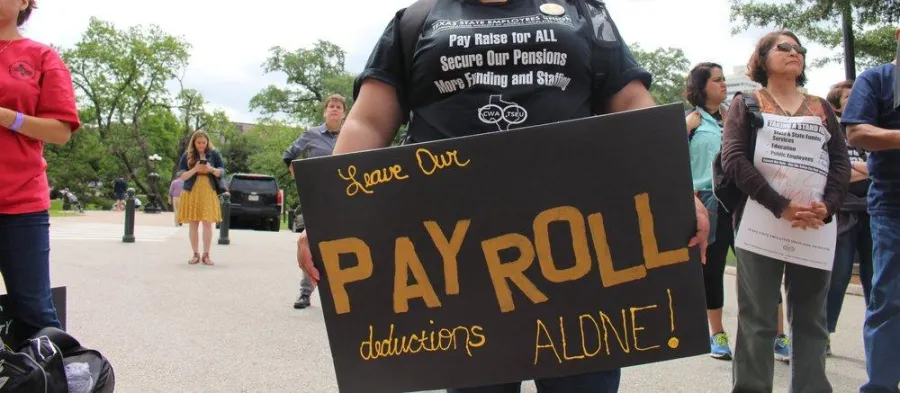DON'T TELL PUBLIC EMPLOYEES HOW TO SPEND THEIR MONEY

Texas AFL-CIO President John Patrick wrote this response to a recent column by Attorney General Ken Paxton in the Dallas Morning News in which the AG advocated for SB 13, which would take away the freedom of state and local employees in Texas to support the labor organizations of their choice through payroll dues deduction
By John Patrick
President, Texas AFL-CIO
If you are an employee in Texas, you likely take for granted your freedom to use payroll deduction to save toward retirement, buy insurance, give to charity and support organizations of your choice.
SB 13, which has passed the Texas Senate, would carve a slice of that freedom from state and local employees by disallowing payroll deduction used to pay dues to labor organizations, including non-union labor associations.
The ideologues who concocted SB 13 claim a need to tell employees how they can spend their own money. Somehow, payroll deduction is wrong for unions or non-union associations, but fine for insurance companies, banks and hundreds of organizations ranging from the left-wing ACLU to the right-wing Focus on the Family.
The real victims if SB 13 becomes law would be tens of thousands of teachers, correctional officers, child abuse investigators, nurses and others who benefit from the ease, safety and convenience of payroll dues deduction.
These are real folks like Martin Barrera, a Correctional Officer at the John T. Montford Psychiatric Unit in Lubbock and member of the American Federation of State, County and Municipal Employees. Proponents of SB 13 argue First Responders, who are exempt from SB 13, separately deserve payroll dues deduction because they put their lives on the line every day. Tell that to correctional officers who have attended funerals for their slain colleagues and cannot predict the moment when the next assault will occur.
"In 2008, my orbital socket was shattered when I was attacked by an inmate," Barrera says, "and yet I continue to serve our state as a correctional officer to keep the community safe. My job is already stressful and dangerous, so why is the Texas Legislature trying to pass a bill that would create extra, unnecessary work for me? I work hard for my paycheck, and I should be able to spend my money as I see fit."
Traci Dunlap, a public school teacher who joined Education Austin, said she knows through hard experience that payroll deduction is the safest way to pay for her voluntary union membership.
"[I]t removes the risk of ID theft and credit card fraud," Dunlap said. "After having my own personal information stolen, and fraudulent activity on two of my credit cards, I can tell you that this is a significant benefit."
Susan Rial of Arlington investigated child abuse for 18 years in Tarrant County. Rial told a Senate committee she does not see any principled basis for separating her sometimes harrowing work from that of police and firefighters as it relates to her membership in the Texas State Employees Union.
"CPS workers are also 'First Responders' and many times are put in very dangerous situations," Rial said.
Legislative committees studying SB 13 have heard from state and local employees who border on "working poor." These employees sometimes have neither credit cards nor checking accounts, often have second jobs and rarely have time to plan finances. Payroll dues deduction provides them an avenue to seek a fair shot at a better deal.
SB 13's supporters have resorted to blowing smoke. Attorney General Ken Paxton ("We must eliminate automatic deduction of union dues from government worker paychecks," April 4) is entitled to the presumption of innocence but not to his own facts:
Contrary to Paxton's tale, deductions are not "automatic." An employee may halt them at any time. It is already an "opt in" system.
Paxton wrongly states union dues are used to "make political donations." State law makes that illegal and it does not happen.
No matter how many times Paxton and Gov. Greg Abbott suggest otherwise, state law requires recipients of any payroll deduction to pay collection costs. Those costs are so negligible they are rarely billed. There is no taxpayer expense.
SB 13 would punish a select group of public employees for speaking up together for better working conditions. If that is Paxton's version of "protecting workers' rights," Texas should take a pass.
John Patrick is President of the Texas AFL-CIO, a state labor federation that includes 237,000 affiliated union members who advocate for working families in Texas.
